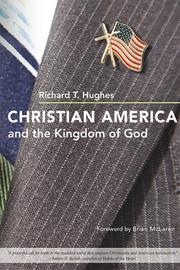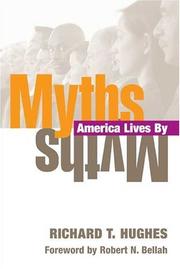| Listing 1 - 7 of 7 |
Sort by
|

ISBN: 1283044013 9786613044013 025209154X 9780252091544 9780252032851 0252032853 9781283044011 6613044016 0252078896 9780252078897 Year: 2009 Publisher: Urbana
Abstract | Keywords | Export | Availability | Bookmark
 Loading...
Loading...Choose an application
- Reference Manager
- EndNote
- RefWorks (Direct export to RefWorks)
Particularism (Theology) --- Kingdom of God --- Christianity and politics --- Election (Theology) --- God, Kingdom of --- Eschatology --- God (Christianity) --- Biblical teaching. --- Political aspects
Book
ISBN: 1684269148 0891125248 Year: 1988 Publisher: ACU Press
Abstract | Keywords | Export | Availability | Bookmark
 Loading...
Loading...Choose an application
- Reference Manager
- EndNote
- RefWorks (Direct export to RefWorks)
Protestant churches --- Primitivism --- History. --- Religious aspects --- Christianity --- United States --- Church history. --- Philosophy

ISBN: 0252028600 Year: 2003 Publisher: Champaign University of Illinois press
Abstract | Keywords | Export | Availability | Bookmark
 Loading...
Loading...Choose an application
- Reference Manager
- EndNote
- RefWorks (Direct export to RefWorks)
Myth --- National characteristics, American --- Nationalism --- Political aspects --- United States --- Foreign relations --- Philosophy. --- History --- Religious aspects --- Christianity.
Book
ISBN: 9780802877291 9781467468091 Year: 2024 Publisher: Grand Rapids Eerdmans
Abstract | Keywords | Export | Availability | Bookmark
 Loading...
Loading...Choose an application
- Reference Manager
- EndNote
- RefWorks (Direct export to RefWorks)
The Churches of Christ is a denomination defined by not being a denomination. These communities intended to restore a primitive Christianity, undivided by historical quarrels. Despite this ideal, the Churches of Christ in America have a surprisingly complex history dating back to the nineteenth century. James L. Gorman’s fresh edition of Richard T. Hughes’s classic work, Reviving the Ancient Faith, illuminates the movement started by Barton Stone and Alexander Campbell. The authors trace the movement’s sociological transformation into a denomination from the 1830s into the twentieth century. Four developments forged this new identity: the premillennialist controversy, the divide over institutions, the racial segregation of congregations and schools, and the fight over liberalism in the 1960s. New to the third edition, the final chapters bring the history of Churches of Christ from the 1960s up to 2022, analyzing the growing diversity of the movement amid intradenominational “culture wars.”
Book
ISBN: 0252050800 0252042069 025208375X 9780252050800 9780252042065 9780252083754 9780252083754 Year: 2018 Publisher: Urbana, Illinois
Abstract | Keywords | Export | Availability | Bookmark
 Loading...
Loading...Choose an application
- Reference Manager
- EndNote
- RefWorks (Direct export to RefWorks)
"In the first edition of Myths America Lives By, Hughes identified the five key myths that lie at the heart of the American experience-the myths of the Chosen Nation, of Nature's Nation, of the Christian Nation, of the Millennial Nation, and of the Innocent Nation. Drawing on a range of dissenting voices, Hughes shows that by canonizing these seemingly harmless myths of national identity as absolute truths, America risks undermining the sweepingly egalitarian promise of the Declaration of Independence. Hughes demonstrates that Americans must rethink these myths in the spirit of extraordinary humility if the United States is to fulfil its true promise as a nation. Hughes locates the roots of each myth in a different period of America's development, and from each of these periods he finds stirring critiques offered by marginalized commentators-especially African Americans and Native Americans-who question the predominant myth of their age. This is a dialog between the mainstream mythmakers and the many critics--including Martin Luther King Jr., Ida B. Wells, Frederick Douglass, Black Elk, Anna J. Cooper, and Booker T. Washington, Malcom X, Angela Davis, and W. E. B. DuBois-whose dissent, rather than being un-American, was often grounded in a patriotic belief in the "self-evident" equality of America's fundamental creed. The second edition of Myths America Lives By continues to investigate how the myth of white supremacy has intersected and continues to intersect with foundational American myths with an entirely new introduction and updates to each myth"--
Myth --- Nationalism --- National characteristics, American. --- American national characteristics --- Demythologization --- God --- Gods --- Mythology --- Religion --- Political aspects --- United States --- History --- Philosophy. --- Foreign relations --- Religious aspects --- Christianity.
Book
ISBN: 168426510X Year: 1987 Publisher: Nashville : The Disciples of Christ Historical Society,
Abstract | Keywords | Export | Availability | Bookmark
 Loading...
Loading...Choose an application
- Reference Manager
- EndNote
- RefWorks (Direct export to RefWorks)

ISBN: 0275970744 Year: 2001 Publisher: Westport, CT Praeger Publishers
Abstract | Keywords | Export | Availability | Bookmark
 Loading...
Loading...Choose an application
- Reference Manager
- EndNote
- RefWorks (Direct export to RefWorks)
Churches of Christ --- Alexander Campbell --- the apocalyptic tradition --- the 1960s --- the United States --- Barton W. Stone --- the early 19th century --- Christianity --- the Disciples of Christ --- denomination in America --- Christian Baptist
| Listing 1 - 7 of 7 |
Sort by
|

 Search
Search Feedback
Feedback About UniCat
About UniCat  Help
Help News
News